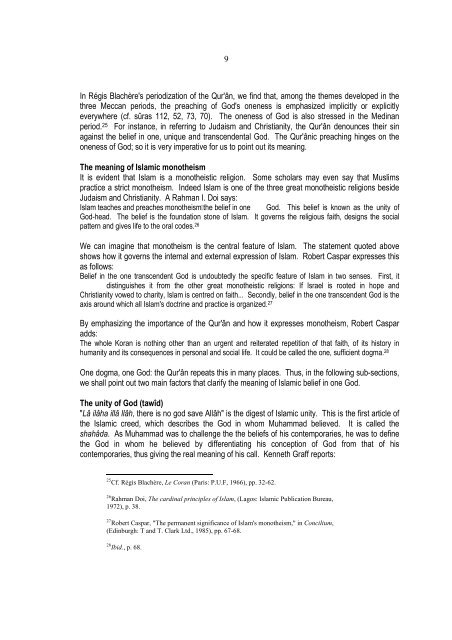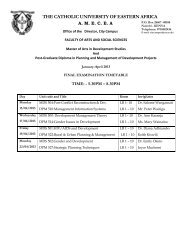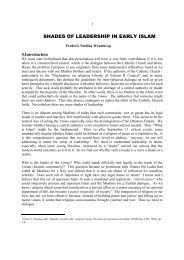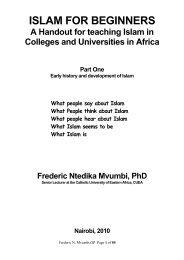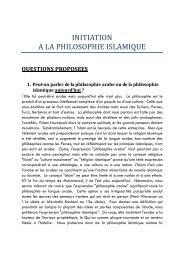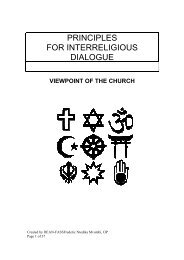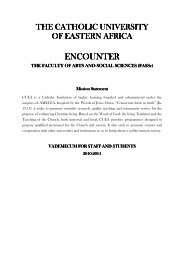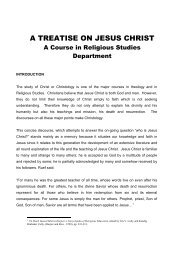8The Qur’ânic preachingAt the beginning of the seventh century of the Christian era, precisely from 610 to 632, Muhammadclaimed to receive the revelation from Allâh and started to proclaim the word of Allâh as he claimedto be told.A Muslim tradition tells us that sûra XCVI was the first to come down to the prophet Muhammad; so themission entrusted to him was from the first the preaching of the word of Allâh. Allâh, as is said toMuhammad in this first sûra, is thy Lord, creator of man, the very generous, who teaches man that which heknew not. 21Though Allâh was known before the rise of Islam, with Muhammad, the conception of Allâhchanged. We know that Allâh was one of the Meccan deities, even the supreme deity but thepreaching of the Qur'ân conceived Him as universal, one and transcendent. In fact, Muhammaddid not try at all to prove the existence of God.The existence of God is strongly affirmed in all the sûras. Muhammad talked about God who isand was revealed to him. The first sûra (of the present text) which is called the "the opening" al-Fâtia because of its importance in alât and in many other forms of prayer, gives the most precioussubstance of Islamic doctrine. 22 The formula "In the name of Allâh, most Gracious, most Merciful"Bi-smi-llâhi r-Ramâni r-Raîm, which is placed before all the sûras except sûra 9, shows that theGod that Muhammad proclaimed not only exists but also is the most Gracious and the mostMerciful. Muhammad believed in the living God; that is why he praises him "Praise to Allâh, theCherisher and Sustainer of the worlds" (sûra 1:2), and worships him: "Thee do we worship andthine aid we seek" (sûra 1:5). Moreover, Muhammad calls God the "Master of the day ofjudgement" (sûra 1:4). Nowadays Montgomery W. Watt tells us that al-Fâtia was considered bysome Muslims as an individual prayer of Muhammad. 23 On realizing this, we see more or less howMohammad was convinced that his call was real and true and came from the living God. sûra 3:2says: "Allâh! There is no God but He, the Living, the Self-Subsisting, Eternal". He is unseen; Heexists: "This is the book; in it is guidance, sure, without doubt, to those who fear Allâh; who believein the unseen, are steadfast in prayer, and spend out of what we have provided for them" (sûra2:2-3). He is present among us; He gives signs to those who obey Him. It is what is said in sûra2:251-252: "By Allâh's will they routed them: And David slew Goliath; and Allâh gave him powerand wisdom and taught him whatever (else) He willed. And did not Allâh check one set of peopleby means of another, the earth would indeed be full of mischief: but Allâh is full of bounty to all theworlds". By analysing all these verses mentioned above, we realize that Muhammad, instead ofproving the existence of God, presented the attributes, the will and the nature of God in whom hebelieved. His preaching on which all Islamic doctrines are built was to tell his contemporaries thatAllâh is the creator of the universe, that he is one. In other words, the Qur'ânic preaching shedlight on the vague knowledge that the pre-islamic Arabs had. Louis Gardet asserts:But the vague notion of supreme (not sole) divinity, which Allâh seems to have connoted in Meccan religion,has to become both universal and transcendental; it has to be turned by the Kur'anic preaching, into theaffirmation of the living God, the Exalted one. 2421 The Encyclopedia of Islam, (London: Luzac and Co., vol. 1, 1960).22 Montgomery Watt, Companion to the Qur'ân (London: George Allen, 1967), pp. 13-14.23 Ibid., p. 14.24 Cf. The Encyclopedia of Islam, (London: Luzac and Co, vol. 1, 1960).
9In Régis Blachère's periodization of the Qur'ân, we find that, among the themes developed in thethree Meccan periods, the preaching of God's oneness is emphasized implicitly or explicitlyeverywhere (cf. sûras 112, 52, 73, 70). The oneness of God is also stressed in the Medinanperiod. 25 For instance, in referring to Judaism and Christianity, the Qur'ân denounces their sinagainst the belief in one, unique and transcendental God. The Qur'ânic preaching hinges on theoneness of God; so it is very imperative for us to point out its meaning.The meaning of Islamic monotheismIt is evident that Islam is a monotheistic religion. Some scholars may even say that Muslimspractice a strict monotheism. Indeed Islam is one of the three great monotheistic religions besideJudaism and Christianity. A Rahman I. Doi says:Islam teaches and preaches monotheism the belief in one God. This belief is known as the unity ofGod-head. The belief is the foundation stone of Islam. It governs the religious faith, designs the socialpattern and gives life to the oral codes. 26We can imagine that monotheism is the central feature of Islam. The statement quoted aboveshows how it governs the internal and external expression of Islam. Robert Caspar expresses thisas follows:Belief in the one transcendent God is undoubtedly the specific feature of Islam in two senses. First, itdistinguishes it from the other great monotheistic religions: If Israel is rooted in hope andChristianity vowed to charity, Islam is centred on faith... Secondly, belief in the one transcendent God is theaxis around which all Islam's doctrine and practice is organized. 27By emphasizing the importance of the Qur'ân and how it expresses monotheism, Robert Casparadds:The whole Koran is nothing other than an urgent and reiterated repetition of that faith, of its history inhumanity and its consequences in personal and social life. It could be called the one, sufficient dogma. 28One dogma, one God: the Qur'ân repeats this in many places. Thus, in the following sub-sections,we shall point out two main factors that clarify the meaning of Islamic belief in one God.The unity of God (tawîd)"Lâ ilâha illâ llâh, there is no god save Allâh" is the digest of Islamic unity. This is the first article ofthe Islamic creed, which describes the God in whom Muhammad believed. It is called theshahâda. As Muhammad was to challenge the the beliefs of his contemporaries, he was to definethe God in whom he believed by differentiating his conception of God from that of hiscontemporaries, thus giving the real meaning of his call. Kenneth Graff reports:25 Cf. Régis Blachère, Le Coran (Paris: P.U.F, 1966), pp. 32-62.26 Rahman Doi, The cardinal principles of Islam, (Lagos: Islamic Publication Bureau,1972), p. 38.27 Robert Caspar, "The permanent significance of Islam's monotheism," in Concilium,(Edinburgh: T and T. Clark Ltd., 1985), pp. 67-68.28 Ibid., p. 68.


